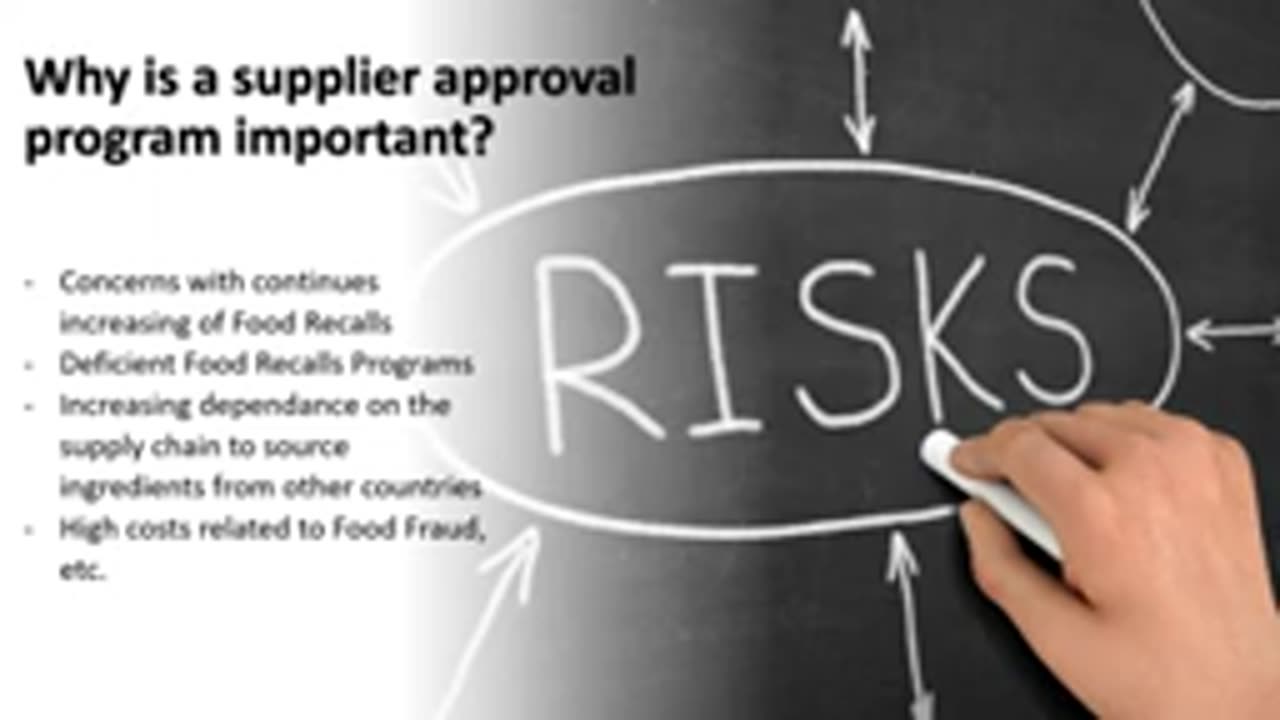Premium Only Content

Supplier Approval Program - Supplier Approval Training - Introduction │ Food Safety
### **Introduction to Supplier Approval Program**
A **Supplier Approval Program** is a key component of a robust food safety system. It ensures that all raw materials, ingredients, and food-contact materials sourced from suppliers meet the required safety and quality standards. By vetting suppliers and monitoring their compliance, food businesses can reduce the risk of food safety incidents, enhance product quality, and maintain regulatory compliance.
---
### **What is a Supplier Approval Program?**
A Supplier Approval Program is a systematic process to evaluate, select, and monitor suppliers. It ensures that suppliers:
- Provide safe and high-quality materials.
- Meet regulatory and industry standards.
- Align with the business's food safety policies and goals.
---
### **Why is Supplier Approval Important in Food Safety?**
1. **Ensures Food Safety:** Prevents the introduction of hazards (biological, chemical, physical, or allergenic) into the supply chain.
2. **Regulatory Compliance:** Meets legal requirements, such as those under FSMA (Food Safety Modernization Act), ISO 22000, or HACCP.
3. **Protects Brand Reputation:** Reduces the risk of recalls or consumer complaints due to supplier-related issues.
4. **Cost Control:** Identifies potential risks early, reducing costly corrective actions.
---
### **Key Elements of a Supplier Approval Program**
1. **Supplier Assessment and Selection:**
- Evaluate potential suppliers based on food safety certifications (e.g., GFSI-recognized schemes like BRCGS, SQF, or FSSC 22000).
- Conduct an on-site audit or review documentation, such as HACCP plans, allergen controls, and sanitation protocols.
2. **Specifications and Agreements:**
- Clearly define product specifications, safety requirements, and delivery standards.
- Formalize agreements with suppliers to ensure compliance.
3. **Risk-Based Approval:**
- Categorize suppliers by risk level based on product type, supplier history, and region.
- High-risk suppliers may require more frequent audits or testing.
4. **Ongoing Monitoring and Communication:**
- Regularly review supplier performance through audits, product testing, and incident reports.
- Maintain open communication channels to address concerns promptly.
5. **Record-Keeping and Documentation:**
- Maintain records of approvals, certifications, inspections, and corrective actions.
- Ensure traceability to verify the source of all materials.
---
### **Supplier Approval Training Objectives**
- Understand the importance of supplier approval in ensuring food safety.
- Learn how to evaluate and select suppliers based on risk and compliance criteria.
- Gain knowledge of regulatory requirements and documentation processes.
- Develop skills to monitor supplier performance and manage risks effectively.
---
### **Who Should Attend Supplier Approval Training?**
- Food Safety Managers
- Quality Assurance Teams
- Procurement Specialists
- Supply Chain Managers
- Regulatory Compliance Officers
---
### **Conclusion**
A well-structured Supplier Approval Program is vital for ensuring food safety and maintaining consumer trust. By rigorously training staff involved in supplier approval and monitoring, food businesses can minimize risks, comply with regulations, and enhance the overall quality of their products.
-
 1:01:17
1:01:17
The StoneZONE with Roger Stone
6 hours agoChristmas Edition: Why the Panama Canal is Part of the America First Agenda | The StoneZONE
27.8K17 -
 LIVE
LIVE
LFA TV
16 hours agoLFA TV CHRISTMAS EVE REPLAY
534 watching -
 LIVE
LIVE
tacetmort3m
1 day ago🔴 LIVE - THE ZONE KEEPS PULLING ME BACK - STALKER 2 - PART 15
1,207 watching -
 22:45
22:45
Brewzle
13 hours agoI Went Drinking In A Real Bourbon Castle
21.9K3 -
 48:36
48:36
PMG
1 day ago $1.03 earned"Parkland Parent Speaks Out On Kamala Harris Using Victims"
15.7K3 -
 4:06
4:06
The Lou Holtz Show
11 hours agoCoach Lou Holtz’s Heartfelt Christmas Message 🎄 | Family, Faith & Notre Dame Spirit 💚 #christmas
11.8K -
![ROSEANNE BARR - Her Journey, TRUMP, and the MAGA GOLDEN AGE! [INTERVIEW]](https://1a-1791.com/video/s8/1/M/m/B/2/MmB2v.0kob.1-small-ROSEANNE-BARR-Her-Journey-T.jpg) 51:35
51:35
Dr Steve Turley
1 day ago $16.79 earnedROSEANNE BARR - Her Journey, TRUMP, and the MAGA GOLDEN AGE! [INTERVIEW]
47.4K49 -
 57:38
57:38
The Tom Renz Show
9 hours agoMerry Christmas - The Tom Renz Show Christmas
85.8K16 -
 2:59:10
2:59:10
Wendy Bell Radio
20 hours agoThe Bridge Too Far
164K301 -
 1:03:45
1:03:45
Donald Trump Jr.
1 day agoHappy Festivus: Airing Our Grievances and Stopping The Swamp w/Sean Davis | TRIGGERED Ep.201
425K546